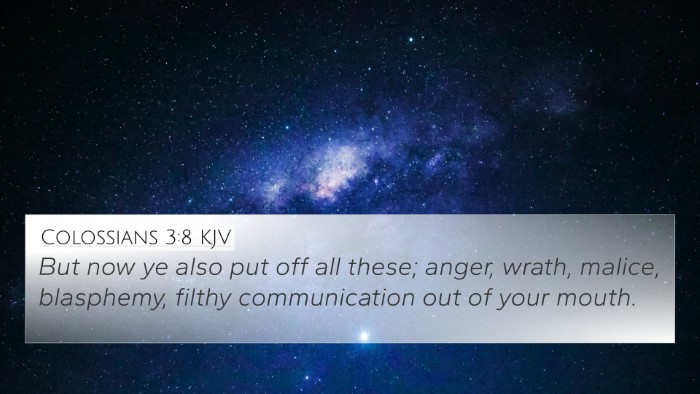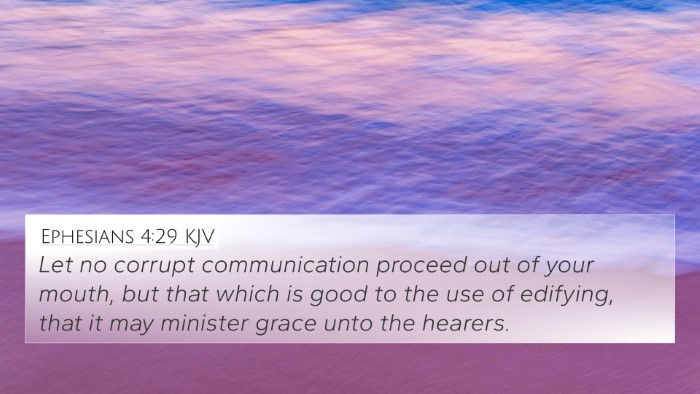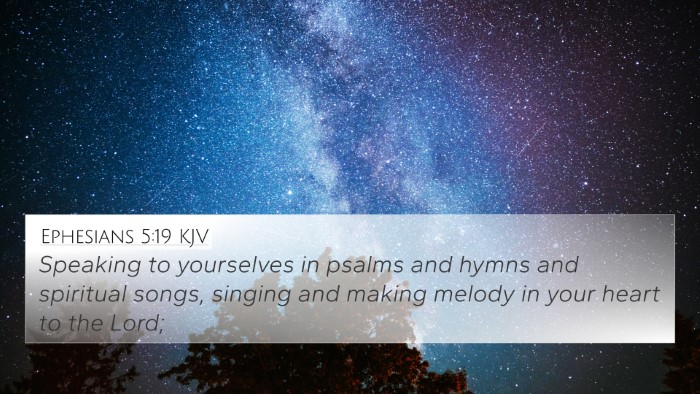Understanding Ephesians 5:4
Ephesians 5:4 states: "Nor should there be obscenity, foolish talk or coarse joking, which are out of place, but rather thanksgiving." This verse addresses the importance of speech in Christian life. It emphasizes the need for respectful and uplifting communication among believers.
Summary of Verse Meaning
The Apostle Paul, in his letter to the Ephesians, stresses the significance of wholesome communication among the members of the church. He warns against negative types of speech such as obscenity, foolishness, and coarse joking, suggesting that these do not align with the character of a Christian. Instead, Paul encourages the practice of thanksgiving and positive discourse.
Insights from Commentaries
-
Matthew Henry's Commentary:
Henry emphasizes the potential harm that negative speech can cause within the community. He points out that such language can lead believers away from their calling and negatively impact their witness to the world.
-
Albert Barnes' Notes:
Barnes interprets this verse as a directive towards maintaining an atmosphere of holiness. He argues that inappropriate language distracts from the graciousness expected in a Christian’s life and contrasts with the notion of thanksgiving which Paul promotes.
-
Adam Clarke's Commentary:
Clarke highlights the spiritual implications of speech, suggesting that what comes out of our mouths reflects our hearts. He states that Christians should be mindful of their words, as they can either reflect the beauty of Christ or present a crude distortion of Christian values.
Thematic Bible Verse Connections
This verse resonates with several key themes found throughout the Bible, creating connections that deepen our understanding of Christian behavior.
- Bible verses that relate to wholesome speech:
- Colossians 3:8: "But now you must rid yourselves of all such things as these: anger, rage, malice, slander, and filthy language from your lips."
- James 1:26: "Those who consider themselves religious and yet do not keep a tight rein on their tongues deceive themselves, and their religion is worthless."
- Proverbs 15:4: "The soothing tongue is a tree of life, but a perverse tongue crushes the spirit."
- Cross-references emphasizing thanksgiving:
- 1 Thessalonians 5:18: "Give thanks in all circumstances; for this is the will of God in Christ Jesus for you."
- Philippians 4:6: "Do not be anxious about anything, but in every situation, by prayer and petition, with thanksgiving, present your requests to God."
Inter-Biblical Dialogue
The insights from Ephesians 5:4 can be further understood by exploring the connections between the Old and New Testament teachings. For instance, the wisdom literature proposes a strong basis for Paul’s admonitions. Proverbs frequently cautions against foolish speech and promotes words of wisdom.
Cross-Referenced Themes in the Bible
Examining the text alongside these additional verses supports the exhortation toward purity in communication:
- Matthew 12:34: "For the mouth speaks what the heart is full of."
- Ephesians 4:29: "Do not let any unwholesome talk come out of your mouths, but only what is helpful for building others up according to their needs, that it may benefit those who listen."
- Romans 14:19: "Let us therefore make every effort to do what leads to peace and to mutual edification."
- Psalm 19:14: "May these words of my mouth and this meditation of my heart be pleasing in your sight, Lord, my Rock and my Redeemer."
Tools for Bible Cross-Referencing
To enhance your Bible study, consider these resources:
- Bible concordances, which help in locating similar themes.
- Bible cross-reference guides
- Comprehensive Bible cross-reference materials that facilitate deeper understanding.
- Cross-reference study guides that assist in finding related verses.
Conclusion
In conclusion, Ephesians 5:4 calls Christians to reflect on the power of speech and the importance of maintaining a standard of conversation that is consistent with a life of thanksgiving and holiness. By exploring connections through cross-referencing biblical texts, believers can gain greater insight into how their communication should reflect their faith.


























